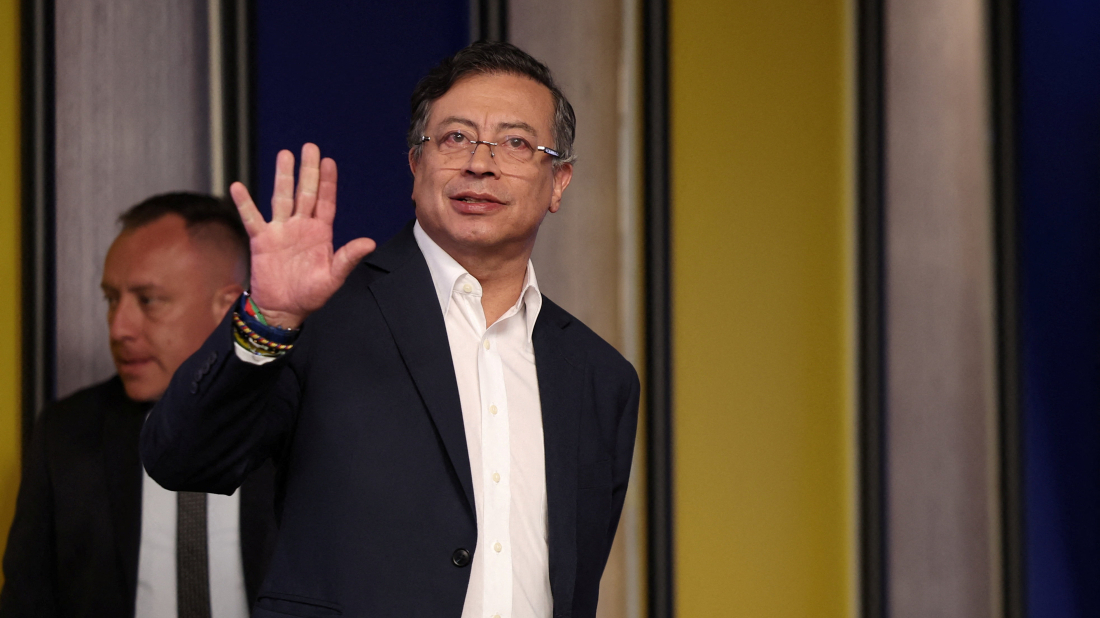The White House: U.S. ground troops ‘not part of plan’ in Iran
The White House says deploying United States ground troops in Iran is not currently part of the military strategy in ...

Colombian President Gustavo Petro said on Thursday that a suspension of U.S. aid would make little difference to his country, although reductions in military assistance could have a tangible impact.
Over the weekend, U.S. President Donald Trump threatened to raise tariffs on Colombia and announced on Wednesday that all funding to the country had been halted.
Colombia was once among the largest recipients of U.S. assistance in the Western Hemisphere, but the flow of money has been abruptly cut this year following the closure of USAID, Washington’s humanitarian aid agency. Military cooperation, however, has so far continued.
“What happens if they take away aid? In my opinion, nothing,” Petro told reporters, noting that such funding often passes through U.S. agencies and largely benefits Americans.
He added, however, that losing U.S. military support would be more consequential.
“Now, in military aid we would have some problems,” he said, explaining that the loss of U.S. helicopters would have the most serious consequences.
The Trump administration has already “decertified” Colombia’s efforts to combat drug trafficking, opening the door to further cuts. Nonetheless, some U.S. military personnel remain stationed in the country, and both sides continue to share intelligence.
Petro has criticised the U.S. military’s strikes against vessels in the Caribbean, which have killed dozens of people and heightened regional tensions. The operations have also drawn condemnation from legal experts and human rights groups.
Trump, in turn, has labelled Petro an “illegal drug leader” and a “bad guy” — remarks the Colombian government has described as offensive.
In response, Petro has recalled his ambassador from Washington, though he met with the U.S. chargé d’affaires in Bogotá late on Sunday.
While Trump has not announced new tariffs beyond the existing 10 percent levy on Colombian goods, he said on Wednesday that he may take “serious action” against the country.
Petro argued that Trump is unlikely to impose tariffs on oil and coal, which together account for 60 percent of Colombia’s exports to the United States, and suggested that any impact on other industries could be offset by finding alternative markets.
Such tariff increases would reverse decades of U.S. policy that sought to make legitimate trade more appealing than the narcotics trade, and analysts warn that higher duties could ultimately strengthen drug trafficking networks.
Although his government continues to face challenges in asserting control over rebel and criminal strongholds, Petro said authorities had seized a record 2,800 metric tons of cocaine in three years, partly thanks to enhanced operations at Pacific ports used for smuggling via container ships.
He also reiterated his claim that Trump’s actions are politically motivated, intended to boost Colombia’s far right ahead of next year’s legislative and presidential elections.
U.S. President Donald Trump said the U.S. military has enough stockpiled weapons to fight wars "forever"; in a social media post late on Monday. The remarks came hours before conflict in Iran and the Middle East entered its fourth day.
U.S. first lady, Melania Trump chaired a UN Security Council meeting on children and education in conflict on Monday (2 March), a move criticised by Iran as hypocritical following U.S. and Israeli strikes that triggered a UN warning about risks to children.
A torpedo from a U.S. submarine sunk an Iranian warship off the coast of Sri Lanka, U.S. Secretary of Defense, Pete Hegseth told reporters as the Iranian conflcit entered its fifth day on Wednesday.
The U.S. embassy in Riyadh was hit by two drones resulting in a limited fire and some material damage, the kingdom's defence ministry said in a post on X on Tuesday, citing an initial assessment.
Shahid Motahari Sub-Speciality Hospital in northern Tehran and parts of the Golestan Palace were bombed on day two of the U.S.‑Israel strikes. AnewZ Touraj Shiralilou is in Iran's capital city and said that the facility was flattened in an airstrike.
The White House says deploying United States ground troops in Iran is not currently part of the military strategy in the ongoing conflict with Tehran.
Israel has warned residents to leave a significant area in southern Lebanon, instructing them to move north of the Litani River as hostilities with the Iran-backed Lebanese group Hezbollah intensified on Wednesday.
U.S. Defense Secretary Pete Hegseth says the United States is making gains in its conflict with Iran after a key Iranian naval target was destroyed, confirming that the strike was carried out by a U.S. submarine off the coast of Sri Lanka. Rescue efforts are now under way for the ship’s crew.
Start your day informed with AnewZ Morning Brief. Here are the top news stories for the 4th of February, covering the latest developments you need to know.
Strikes across the Middle East are intensifying, fuelling travel disruption, driving up global energy prices and forcing diplomatic missions to shut their doors.
You can download the AnewZ application from Play Store and the App Store.

What is your opinion on this topic?
Leave the first comment